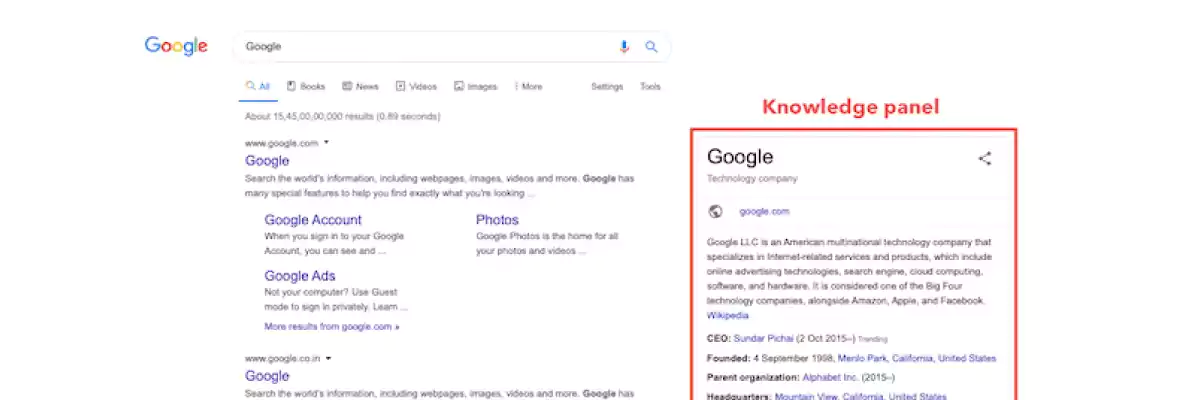Ways Markup schema Helps in Enhancing The Google Knowledge Panel

Right-hand or right-rail information boxes appear in Google search results when you look up a specific person, location, business, or entity. An example of a Google Knowledge Panel. On a PC, they stand out like a sore thumb! Knowledge panels can be recognized by including a share button next to the entity name.
When Google finds an entity in a user's query, it will provide a Knowledge Panel with further information about it. The entities in Google's knowledge graph and reputable websites like Wikipedia are the sources of this data. Using structured data like schema markup, you may aid Google by feeding and improving your branded or local knowledge panel.
schema Markup: What Is It?
If you use schema markup to provide search engines with structured data, they can better understand your material. Using this markup will help you rank higher in search engines.
The value of using schema markup

Rich snippets powered by schema markup typically have higher click-through rates than "normal" search results. People will flock there as a result.
However, the markup's primary purpose is to aid search engines in comprehending your work.
The markup's community, schema.org, wasn't founded on a whim; it predated Google's Knowledge Graph, an entity-and-relationship database, by a full year.
As you might expect, schema markup significantly contributes to this information.
What do mobile knowledge panels look like?
Information from Google's Knowledge Graph may be provided in one or more knowledge panels dispersed across the search engine page results due to the smaller screen size on mobile devices. Business knowledge panels optimized for mobile devices feature content comparable to that found on their desktop counterparts, such as:
Company Title
Corporate Icon
Website address and link
Executive Overview of the Firm
Methods of communication
Links to various social media platforms
Revenue and stock prices (if relevant)
The Carousel That Folks Are Looking For
Due to the smaller screen size, mobile knowledge panels do not provide as much detail about a given topic as their desktop counterparts.
Mobile knowledge panels become extremely intriguing to humans when they can access and use this information anywhere. Google knowledge panels for persons provide a carousel of photos for the entity in question in a mobile experience, as opposed to only a logo like company knowledge panels or corporate panels. Videos, books, and People Also Search For carousels may appear at the bottom of a user's knowledge panel. The best part about mobile knowledge panels is that they provide specific details on the research entity. Because of his job as a professional basketball player, the search results for LeBron James on a mobile device will include his height in the knowledge panel.
How many distinct flavors of Google Knowledge Panels are there?

A Google Knowledge Panel can be either local or branded (ex. Organization, Person). This piece will break down the key distinctions between the two and outline the steps necessary to implement structured data markup and get a knowledge panel for your online store
Local Knowledge Panel
When Google determines that a search query has local intent, it will provide a box with relevant information. If I look up a local brewery by a name like "Block Three Brewing Company St Jacobs," Google will show me info specific to that brewery in a local knowledge panel since it thinks my search has local intent. You will see different knowledge panels all over the search engine results pages.
Making a Google Business Profile account is the first step toward obtaining a local knowledge panel. For a local knowledge panel to appear in search results, Google Business Profile (GBP) must first be created. After creating a Google My Business page, you can claim it as your own and begin filling it out with information about your company that you want to appear in Google searches. Information such as your company's phone number, address, hours of operation, client reviews, and ratings can all be displayed on your Google Business Profile. In addition, you may see this data in your knowledge panel.
Local Knowledge Panel Structured Data
You should also include LocalBusiness schema markup and test your site in Google Search Console. The structured data you provide helps Google understand your company and establishes associations between your company and other entities in the Knowledge Graph. This helps search engines understand the context of your website's content and provide more relevant results for a user's query. Including structured data in your site's code can also boost the probability that Google's local knowledge panel will appear next to your search results.
Branded or Individualized Knowledge Panel
You can't apply for your knowledge panel or brand, and Google will evaluate if you or your brand is credible and authoritative enough to merit one. When searching for a well-known person or brand, a "knowledge panel" will often show above the search results if there is a corresponding Wikipedia page. Watch as Canadian star Ryan Gosling has his very own Google Knowledge Panel.
Google has a tough time with personal knowledge panels. Hundreds, if not thousands, of people on the internet may share the same name, making it difficult for knowledge panels to provide accurate results. You can see why the subject of the personal knowledge graph, defining home for your entity, is so crucial. This is where the use of structured data comes in.
Organized Information for Branded Knowledge Panels
To Google, this "entity home" represents the most reliable information source. Personal homepages, "about us" sections of business websites, and social media profiles are all excellent examples of "entity homes" for individuals. Instead of using a social network profile you own and over which you have no real control, you should use a domain name. After settling on a home for your entity, you should use structured data to mark up all pertinent information so that Google can better comprehend and present it in your knowledge panel.
When will I see a knowledge panel?
A knowledge panel will show when a search query contains an entity that Google knows about. A single, well-defined thing or idea is an entity or a named entity. Web content objects can be defined as unique entities with their properties and relationships to other entities using unique identifiers such as @ids or URIs. Once described, structured data can be used to create a connection to Google's Knowledge Graph. Once your entity has been added to Google's Knowledge Graph, it will be given a unique URL that identifies it as such. Locate this by selecting the share button next to the entity's name.
To further strengthen your brand's trustworthiness, you can use the same attribute inside the HTML for your site to connect your company's name to the knowledge graph URL. Connect the items described on your website to information found on other high-quality knowledge graphs, such as Wikipedia articles. By linking to the relevant Wikipedia article for a given city, region, or nation using the area served property; you may help local users find your brand or business. Your website's content will be more contextualized by search engines if you use knowledge graphs to link information and data from around the web.
Knowledge panels only display information from reputable, high E-A-T sources preferred by search engines. Wikipedia, Wikidata, LinkedIn, Facebook, and many others fall into this category. In cases when Google has high confidence in the integrity of the data, it will add it to its knowledge graph.
How can knowledge panels benefit from and be fed by structured data?

Do Google's knowledge panels always result from structured data? The short answer is "no," but it will add to and improve your mental storage of information. Search engines will have an easier time indexing and contextualizing your site's data if you use markup to convert your human-readable information into the machine-readable language of JSON-LD.
Depending on your needs, you might label your website as a LocalBusiness, an Organization, a Person, or some other subtype. If your company has a physical location and its address is easily found online, you should probably select the LocalBusiness entity type.
The Organization type is recommended if the company does not have a physical location, such as an online store, a brand, or a mobile service. Indentation indicates a subtype relationship in the hierarchy of terms. Hence the complete list of schema.org types can be found in its Full Hierarchy. If you want to ensure you're utilizing the correct type for your business, you should look out for the definitions on schema.org.
Use schema markup on your homepage. Google's Knowledge Graph will pull information from your site rather than a third-party resource like your Wikipedia page (which you don't own) or your public social media profiles (which you only semi-own).
Controlling the information in your knowledge panel is essential to establishing trust, especially when competing with sources like Wikipedia. schema markup and internal management of the data is the recommended approach.